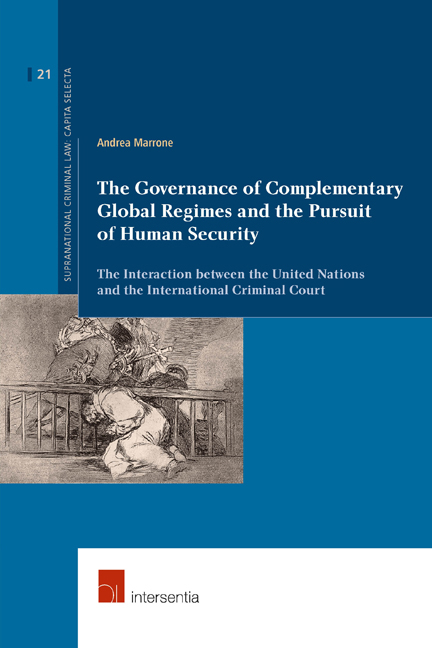 The Governance of Complementary Global Regimes and the Pursuit of Human Security
The Governance of Complementary Global Regimes and the Pursuit of Human Security from PART II - THE GOVERNANCE OF COMPLEMENTARY GLOBAL REGIMES: CHALLENGES, OBSTACLES AND CONCERNS
Published online by Cambridge University Press: 15 December 2017
PRELIMINARY REMARKS
As reported in the previous chapters, at the end of the six-week diplomatic conference held in Rome in 1998, 120 countries voted in favour of the Rome Statute. The political support and the development of the treaty-law meant the establishment of new public institutions committed to end the impunity of the gravest crimes known to humanity and bring justice to the victims. The Rome Statute institutions are: the International Criminal Court with exclusively a judicial mandate, the Assembly of States Parties which is the management oversight and legislative body of the Court, and the Trust Fund for Victims implementing Court-ordered reparations and provide physical and psychosocial rehabilitation or material support to victims of crimes within the jurisdiction of the Court. The US joined China, Libya, Iraq, Israel, Qatar, and Yemen as the only seven countries voting in opposition to the treaty, while twenty-one countries abstained. When looking at: a) the rejection of the Rome Statute by powerful States; b) the political impasse at the regional level as for instance in the African Union; and c) the difficulties of complementarity at international level, we notice that cooperation is very difficult to realize. In order to implement a global architecture fostering peace, justice and security able to influence ‘l’état de droit’ and the institutional capacity-building in domestic realities, competence allocation, delimitation of competence, institutional reform, mutual and complementing support between such international institutions, are fundamental preconditions of democratic governance involved in the prevention of mass atrocities, including the importance of their working methods in case of international interventions and judicial referrals in situations of war and crime.
The first section of this chapter focuses on the institutional contours characterizing the emerging regime of international criminal justice responsible of a systemic change promoting the links between human security and justice (Assembly of States Parties, Trust Fund for Victims and the Court). In order to build a model of international criminal justice it is important to start with strong fundaments at institutional, administrative and legislative levels complementing an independent international judiciary. Such institutional contours dealing with human rights and justice represent the indicator of public authority and the resources allocated in these fields of global governance.
To save this book to your Kindle, first ensure [email protected] is added to your Approved Personal Document E-mail List under your Personal Document Settings on the Manage Your Content and Devices page of your Amazon account. Then enter the ‘name’ part of your Kindle email address below. Find out more about saving to your Kindle.
Note you can select to save to either the @free.kindle.com or @kindle.com variations. ‘@free.kindle.com’ emails are free but can only be saved to your device when it is connected to wi-fi. ‘@kindle.com’ emails can be delivered even when you are not connected to wi-fi, but note that service fees apply.
Find out more about the Kindle Personal Document Service.
To save content items to your account, please confirm that you agree to abide by our usage policies. If this is the first time you use this feature, you will be asked to authorise Cambridge Core to connect with your account. Find out more about saving content to Dropbox.
To save content items to your account, please confirm that you agree to abide by our usage policies. If this is the first time you use this feature, you will be asked to authorise Cambridge Core to connect with your account. Find out more about saving content to Google Drive.